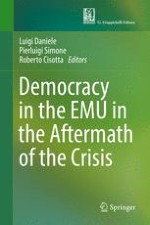2017 | OriginalPaper | Buchkapitel
Respecting the Democratic Principle in ESM Activities Related to the Context of the Economic and Financial Crisis
verfasst von : Pierluigi Simone
Erschienen in: Democracy in the EMU in the Aftermath of the Crisis
Aktivieren Sie unsere intelligente Suche, um passende Fachinhalte oder Patente zu finden.
Wählen Sie Textabschnitte aus um mit Künstlicher Intelligenz passenden Patente zu finden. powered by
Markieren Sie Textabschnitte, um KI-gestützt weitere passende Inhalte zu finden. powered by
